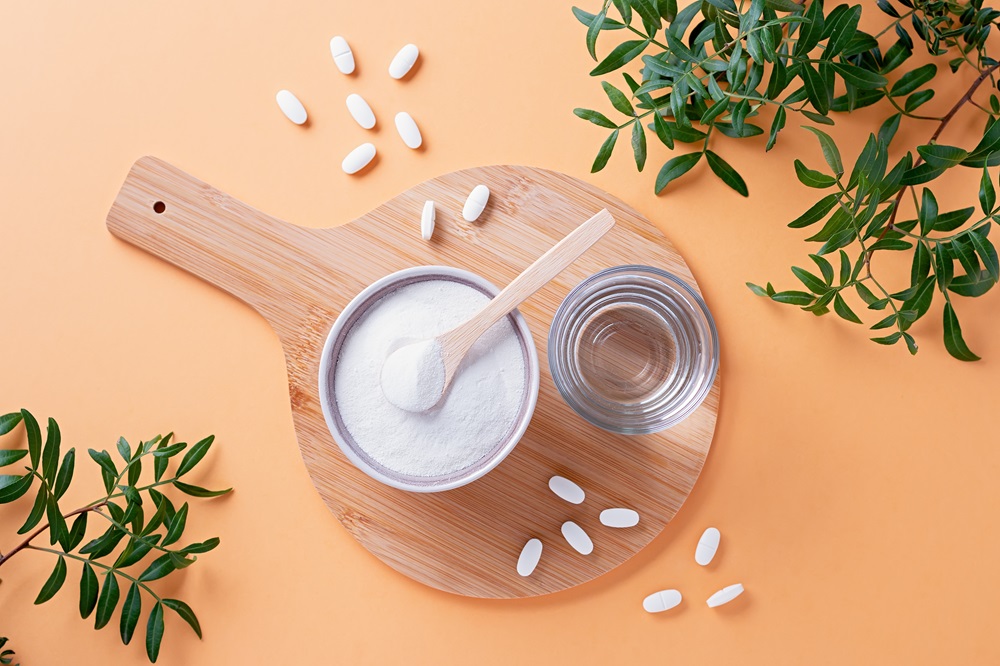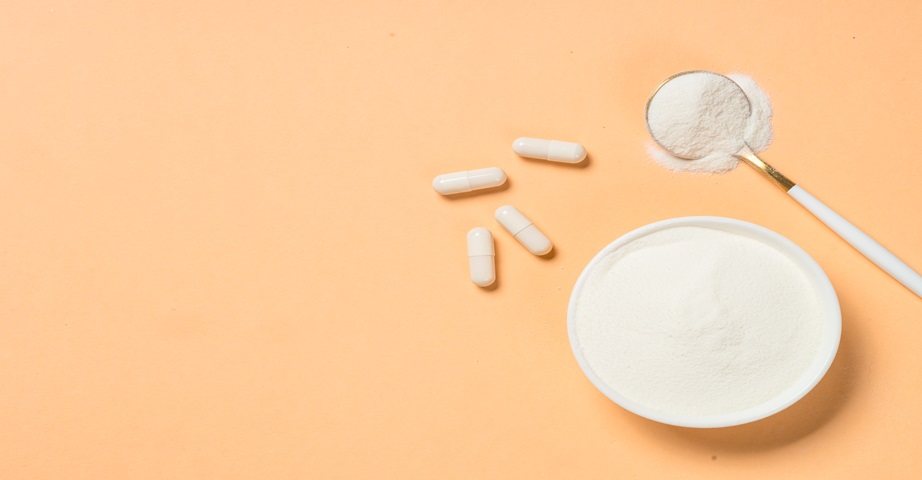
Collagen is a structural protein that is one of the main components of connective tissue. It is a building compound that can be naturally synthesized in the human body, as well as delivered to the body with food or in the form of dietary supplements. It is a substance that can provide mechanical strength of tissues, and can also positively affect the renewal processes occurring in the skin. Collagen - what is it? How does collagen work? What are the side effects of collagen use? Collagen functioning - is it worth taking preparations containing the compound?
Summary
What is collagen?
Collagen is the basic building protein of the human body and animal organisms. It is a natural polymer, fibrillar protein, which is the main component of the intercellular substance. It is a compound that occurs in connective tissue and is part of cartilage, bones, tendons, ligaments, teeth and skin.
The synthesis of collagen takes place primarily in fibroblasts, and the strength of the compound results from the structure of the substance - the basic structural unit of collagen protein is tropocollagen, or long, triple helix, which arises from the mutual wrapping of chains containing tripeptide sequences.
Collagen is a non-complete protein, which means that the compound does not provide the human body with all the essential amino acids. However, the substance is a source of valuable nutrients, including endogenous amino acids such as proline and glycine, and bioactive peptides and hydroxylated amino acids, such as hydroxyproline.
Collagen makes up about 30% of all proteins that create the human body. It is a compound that is formed in the human body, but the natural synthesis of the component decreases with age. According to the current state of knowledge, after the age of 25, the content of collagen in the body systematically decreases, after the age of 30, the losses of the compound exceed the natural synthesis of collagen, in turn after 60. the body is no longer capable of producing the ingredient itself.
Collagen types
Collagen is not a single protein with a specific structure - almost 30 different types of collagen can be distinguished. The most popular types of compound are:
- Collagen type I - accounts for about 90% of all collagen occurring in the human body. This is the most powerful form of the component that occurs in the skin, tendons, ligaments, as well as in the bones;
- Collagen type II - a type of collagen that occurs primarily in cartilage and bones;
- Collagen type III - the second most important type of structural protein, which can be found in blood vessels. It is a form of an ingredient that, along with collagen type I, participates in most processes occurring in the human body;
- Collagen type V - contributes to the construction of the lungs, bone matrix, placenta or liver. It is also essential for hair growth and eye health;
- Collagen type X - one of the building blocks of bone, which occurs in cartilage.
Recommended dietary supplements with collagen
Collagen sources
Collagen is a compound that can be formed in the human body. However, the natural production of the ingredient decreases with age, which is why it is worth considering providing collagen to the body also from the outside - with food, or in the form of dietary supplements.
Collagen is an ingredient that can be found in animal products. The substance can be obtained from animal skins, bones, cartilages and tendons. Thus, sources of collagen are considered, among others, chicken skin, offal, decoctions cooked on bones, gelatin, crow's feet or fish skin. Nutrients are also necessary for the production of collagen, which can support the production of the compound in the body - in the daily diet it is worth paying attention to the appropriate supply of vitamin C, as well as vitamin A, zinc, and, copper or manganese.
Since foods considered to be natural sources of collagen are high-fat foods that can provide the body with significant amounts of cholesterol, it is not recommended to include this type of products in the daily menu. Among people who are struggling with collagen deficiency or are distinguished by increased demand for the compound, dietary supplements containing the desired substance may be helpful.
Read also: Excess and deficiency of collagen - causes, symptoms and effects
Collagen - what does it work for? Collagen properties
Collagen, called the protein of youth, is one of the main components of the skin, which is responsible for the continuity of renewal processes occurring in the skin. It is a compound that is responsible for moisturizing the skin, as well as for its elasticity and firmness. The use of collagen can delay the aging process of the skin, and what is more, it can have a positive effect on the reduction of wrinkles. The substance can also improve skin tone and eliminate discoloration occurring on the face, and can also accelerate the regeneration of the epidermis and wound healing. The compound may reduce the visibility of stretch marks and scars and may have a positive effect on the condition of nails, reducing their brittleness. The protein of youth can also strengthen hair, prevent hair loss and reduce graying and improve the condition of the scalp.
Collagen is a substance that is involved in the production of synovial fluid. Thus, the component can reduce friction between joints, and moreover, it can increase the flexibility and mobility of the locomotor system. The compound can also reduce pain and rebuild cartilage tissue, and can also relieve the symptoms of osteoarthritis.
As if that were not enough, the protein of youth can reduce the risk of injury among physically active people, and can also positively affect the course of regenerative processes occurring in the muscles after exercise. The ingredient can accelerate the return to full condition after various types of injuries, and can also reduce bone degradation, positively affect their mineral density and reduce the risk of developing osteoporosis.
Structural protein, which is collagen, can also have a beneficial effect on the work of the cardiovascular system. The results of scientific studies suggest that the compound may have a positive effect on the elasticity of the arteries, and may also reduce systolic blood pressure and contribute to the reduction of LDL cholesterol. Thus, it seems that collagen may have cardioprotective properties.
The analyses obtained so far also inform that collagen may support the regeneration of the intestinal mucosa and stomach, relieve inflammation in the digestive system, and may also support the proper functioning of the immune system.

Collagen - purpose
Collagen fibres are distinguished by their wide purpose - they are widely used in various industries and medicine. Collagen is a substance used as a component of anti-wrinkle and firming cosmetics, which can be found, among others, in body lotions, face creams, as well as in make-up remover. The compound is also used in aesthetic medicine as a tissue filler that can reduce wrinkles, reduce the visibility of scars or model the face or shape of the lips. The substance is also used for the production of surgical suture or implants, and also used in tablets as a protein carrier.
Collagen is very popular among people who care about a healthy and beautiful appearance, as well as among athletes who care about supporting the body during intense efforts. Thus, the compound is a popular component of dietary supplements, which are available on the market in various forms - collagen is available among others in tablets, capsules or in the form of powder, and the selection of the right form of collagen supplementation is a matter of individual needs and preferences of the consumer.
Kind of collagen
On the market of collagen supplements can be found preparations containing various types of collagen. However, fish collagen and beef collagen are the most popular. What are the characteristics of different types of compounds? Which one is better?
Fish collagen, also known as marine collagen, is a compound with a specific odor that is distinguished by a structure similar to human collagen. It is a substance that is characterized by high bioavailability, being primarily a source of type I collagen. It is a form of ingredient that is well absorbed in the human body.
Beef collagen is a substance obtained from the skins, bones and cartilage of cattle. This compound is considered a source of type II collagen, which is devoid of unpleasant odor. It is a substance with great bioavailability, which can provide the human body with higher amounts of hydroxyproline than fish collagen, which can positively affect the thermal stability of the compound.
Both beef collagen and marine collagen can have a positive effect on the functioning of the human body, supporting the condition of the skin, hair, nails, as well as joints and muscles. Some data suggest that fish collagen may be distinguished by more effective absorption, which is why it may be a better choice among consumers who do not suffer from fish allergy.
When choosing preparations with collagen, it is worth reaching for products containing hydrolysed collagen, which is better absorbed and more effective compared to the intact form of the compound.

Collagen - side effects
Collagen supplied to the body in the form of dietary supplements, used in accordance with the manufacturer's recommendation, seems to be a safe substance that should not contribute to the occurrence of undesirable side effects.
Among some people who provide the body with excessive amounts of the component, you can observe the occurrence of undesirable symptoms, such as nausea, vomiting, diarrhea, a feeling of fullness or bloating.
Long-term, excessive supply of the component may cause thickening and hardening of the skin, as well as tingling of the limbs or joint pain.
Collagen - contraindications
People with allergies to a specific source of collagen should avoid the use of collagen supplements based on them and give up food products containing a type of collagen, which can promote the occurrence of an allergic reaction.
Collagen supplementation may not be a good solution also among people struggling with kidney diseases, which should limit protein intake, as well as among consumers who have been found to have keloids and excessive wound healing.
Since preparations containing collagen can interact with certain medications, when taking pharmaceuticals, it is worth consulting a doctor before starting collagen supplementation.
Bibliography:





